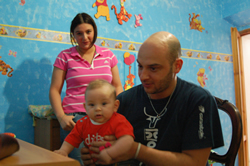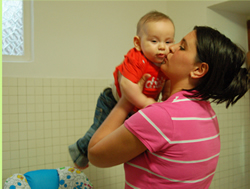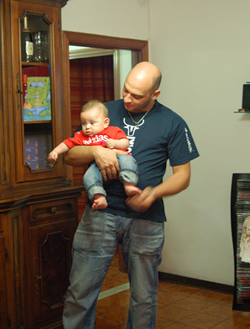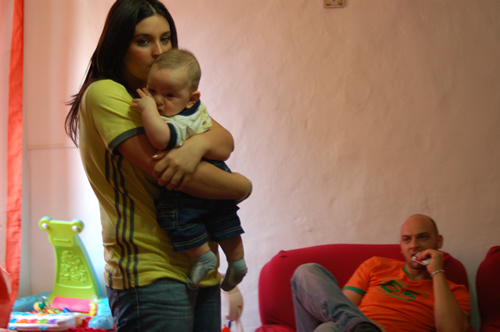Francesca Corazzi and Roberto Diotalevi at home with their child.
Love regardless
Italian couples share their relationships, often without being married
Text By Diana Blass
Inside their Cagli apartment a young couple sits with their baby, holding and playing with him as a huge smile stretches across his face. Taking a step into their world, any outsider would assume that the two are married with their first child.

Dinner time.
In fact, they are not married.
In a nation steeped in the Catholic tradition, and in a city with 15 churches, Francesca Corazzi, 21, and Roberto Diotalevi, 30, are unwed parents, part of a cultural change that has been moving through the Catholic country of Italy with surprising speed.
"Many people feel that for a psychological aspect they must test out the marriage," says Nozzareus Bartolucci, priest of the local parish.
Dating for about two years, Corazzi and Diotalevi welcomed their first child into the world five months ago. The news of their child changed their relationship, beginning with their living arrangements.
"Shortly after learning of my pregnancy," says Corazzi, "we decided to move in with one another." They have been living together, unwed, for about a year now.
According to Bartolucci most couples used to marry at 22 but are now waiting until almost 30 to tie the knot. And, many times this marriage occurs only after the couple has lived together and has had a child.
Many of the locals view this change as directly correlated to the decline of religion, which is slowly losing importance for young people. The older generation commonly believes that people are more concerned about creating a strong economic position than creating a life-long commitment.
Bartolucci describes modern wedding ceremonies as having a big lunch, and receiving expensive objects and elegant gifts. "Money is not everything, but it is important. People at 22 don't have a real job any more. They have just graduated from university and are just beginning to get their lives together."
A local café owner, Mimi Bartoli, 68, gives her perspective on this change. Legs crossed, with a cigarette in one hand, she begins to describe her view on what is becoming all too common in Italian culture.

Bath time.
"In the past people were in love, no question," she says. " Now people marry just to marry, it has lost a lot of the religious affiliation it once had."
Bartoli goes on to describe how only the older people go to church every Sunday. She remembers how religious activities used to be a way to go out with friends, but now it's overshadowed by the cinema and shopping.
In her opinion today's couples have no support for one another the way they did in the past. She thinks that people like to "test" married life, rather than just believe in what it has to offer and take the struggles together, as a united couple, as they come along. Therefore, if something doesn't work out, it's a whole lot easier to simply walk away, than to work hard at the promise that was made.
Corazzi agrees with Bartoli on some levels, recognizing that there is a real change of attitude between generations when it comes to a wedding. "Few people feel that religious connection. A wedding is mostly because of the party and not for a real religious feeling at all."
Yet, despite the criticisms about today's couples from the older generation like Bartoli, Corazzi and Diotalevi feel that most of the pressure to marry comes from the church. "We feel that the church has different opinions as to how we should live our lives, but we are not saddened by this, and we know that we are good parents."

Play time.
The couple says that their relationship even has its own advantages that a marriage does not offer, beginning with separation.
Corazzi and Diotalevi both agree that separating without problems is the main benefit to their relationship. They don't need to worry about filing for a long and tiresome divorce, but rather can go their separate ways in their own manner, if necessary. Also, divorce has some serious repercussions in the eyes of the church.
Bartolucci confirms the fact that the church has a strict and unbending rule when it comes to the sacraments placed before God. Therefore, no divorce of any kind is tolerated within the Catholic community. This has led to a significant amount of pressure and fear instilled in that walk down the aisle, which is one of the main reasons why Corazzi and Diotalevi are among the many to "test it out" first.
Corazzi describes some other benefits that the Italian government has made available to her. While a young married couple receives a benefit to pay for a house, the government also issues an unwed mother about €1400 a month to support her child and herself as well. This allows Corazzi to take a maternity leave and to better care for her newborn. Similar to the church though, the Italian government is strict on one thing: there is no civil union practiced within the country of Italy. As Father Bartolucci notes, "a religious union is a civil union."

Toys.
Laws have been proposed that would create domestic partnerships to provide health and social welfare benefits to unmarried couples, but they were defeated by opposition from the Catholic Church and a conservative Senate.
Marriage seems to be the only option for those who wish to bond officially in both the country and God's eyes. With the fear of divorce, the pressure to maintain that bond has become far too much for many to handle.
Corazzi and Diotalevi plan to get married one day. Corazzi argues that while others may not feel the pull of religion, she wants to share her love with the church.
When asking Father Bartolucci if Corazzi and Diotalevi's current lifestyle creates any obstacles to their future marriage, Bartolucci simply replies, "the church tries to forgive, and it ultimately depends on the people. I'm here to care for people that are in a bad world."
In the town of 15 churches, all agree times will continue to change.

![]()

